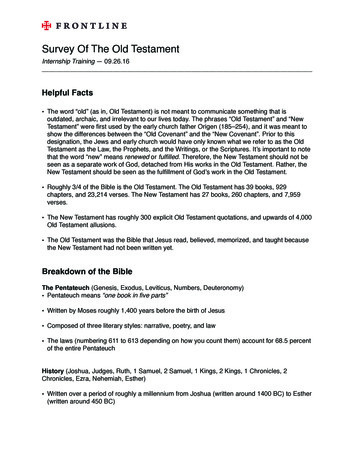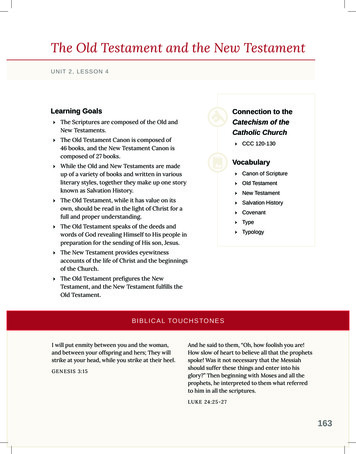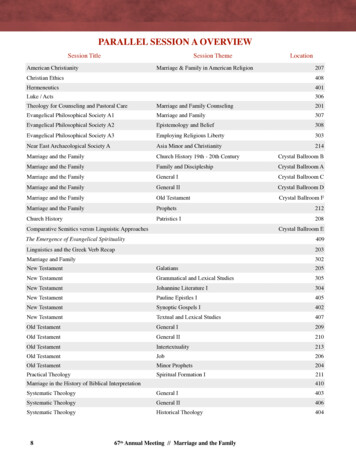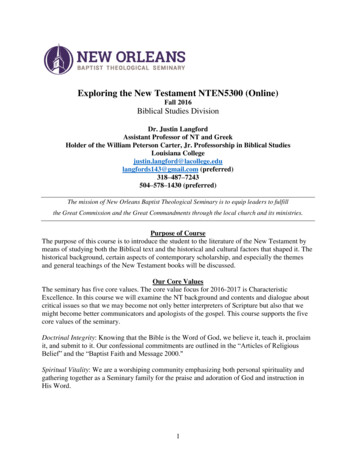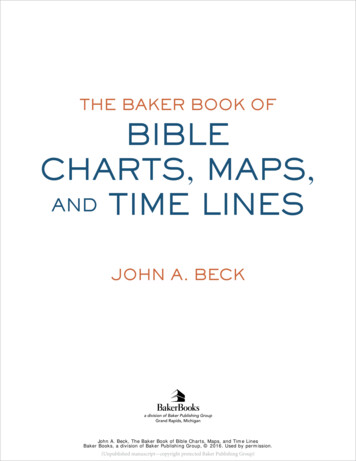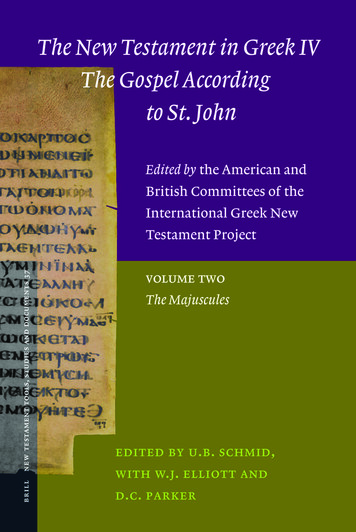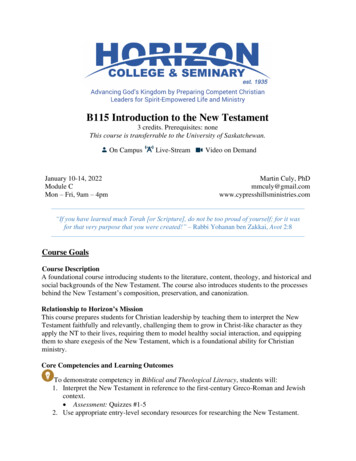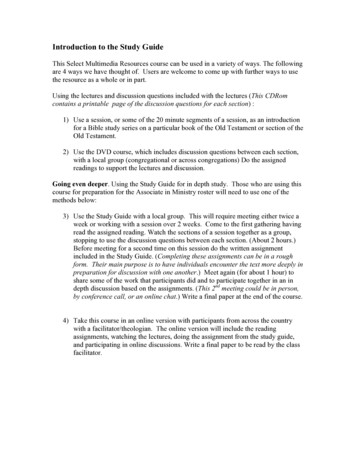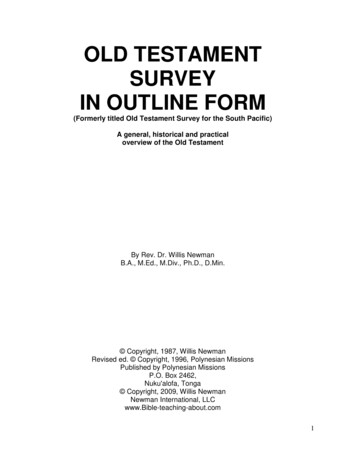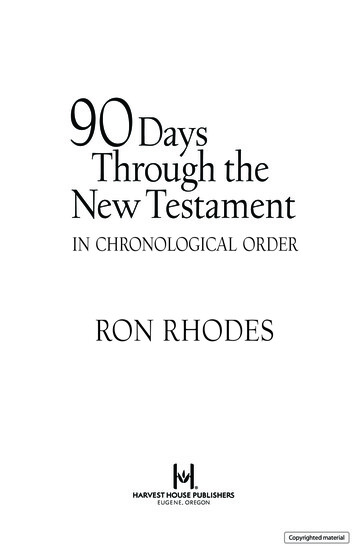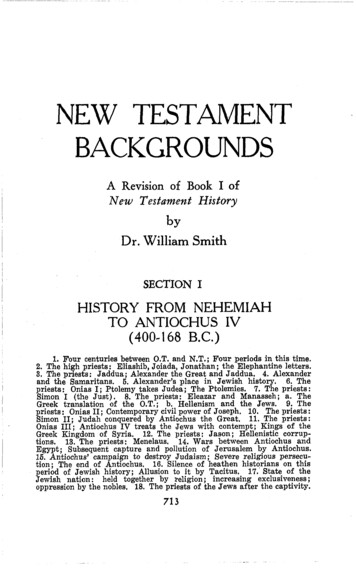
Transcription
NEW TESTAMENTBACKGROUNDSA Revision of Book I ofNew Testament HistorybyDr. William SmithSECTION IHISTORY FROM NEI- Eh IAHTO ANTIOCHUS IV(400- 1 68 B.C.)1. Fpur centuries between O.T. and N.T.;Four periods in this time.2. The high priests: Eliashib, Joiada, Jonathan; the Elephantine letters.3. The priests: Jaddua; Alexander the Great and Jaddua. 4. Alexanderand the Samaritans. 6. Alexander’s place in Jewish history. 6. Thepriests: Onias I; Ptolemy talces Judea; The Ptolemies. 7. The priests:Simon I (the Just). 8. The priests: Eleazar and Manasseh; a. TheGreek translation of the O.T.; b. Hellenism and the Jews. 9. Thepriests: Onias 11; Contemporary civil power of Joseph. 10. The priests:Simon 11; Judah conquered by Antiochus the Great. 11. The priests:Onias 111; Antiochus I V treats the Jews with contempt; Kings of theGreek Kingdom of Syria, 12. The priests: Jason; Hellenistic corruptions. 13. The priests: Menelaus. 14. Wars between Antiochus andEgypt; Subsequent capture and pollution of Jerusalem by Antiochus.16. Antiochus’ campaign to destroy Judaism ; Severe religious persecution; The end of Antiochus. 16. Silence of heathen historians on thisperiod of Jewish history; Allusion to i t by Tacitus. 17. State of theJewish nation : held together by religion ; increasing exclusiveness ;oppression by the nobles. 18. The priests of the Jews after the captivity.713
NEW TESTAMENT BACKGROUNDSWATCH FOR ANSWERSTO THESE QUESTIONS:1. How many centuries elapsed between the Old andNew Testaments?2. What are the four periods of history between the O.T.and the N.T.?3. W h a t Jewish official became the most important person in the state after the time of Nehemiah?4. What are the Elephantine papyri?1. Who is the last named high priest in the O.T.? Whatfamous person is this priest supposed to have confronted?6. W h a t made Alexander the Great angry with theSamaritans? What did he do to punish them?7. What was the grandiose goal in Alexander’s mind as heset out to conquer the world?8. What language came to be spoken nearly everywhereafter the conquests of Alexander?9 . Who were the Ptolemies? What woman was the lastof the Ptolemies?10. How did the Jews regard the priest Simon I?11. Under what Egyptian king was the Greek SeptuagintOld Testament translated? Where?12. What is Hellenism?13. What kingdom took over Palestine from the Ptolemiesof Egypt? Date?14. By what titles (or nicknames) were the Syrian kingsAntiochus I11 and Antiochus IV called?1 s. What were some of the Greek customs which theSyrians and their sympathizers introduced at Jerusalem?16. What terrible things did Antiochus IV do to the templein Jerusalem and eo its citizens?17. What edict about worship did Antiochus IV issuethroughout his dominion?714
INTRODUCTION18. What was the temple in Jerusalem converted into?19. What food were some Jews forced to eat?20. How many brothers of one family were slain beforethe king?21. How did Antiochus Epiphanes die?22. Do heathen historians tell much about the persecutionsof the Jews by Antiochus?23. Had the Jews become purified from their old idolatriesby this time?24. Were the Judean nobles on the side of the Jewish people or of the Syrians? Why?I. Pour centuries between Old and New Testaments;four periods in this time.The interval of four centuries, from the close pf therecbrds of the Old Covenant to the events which heraldedthe birth of Jesus Christ, may be divided into four periods:-the continuance of the Persian dominion, till B.C. 3 3 1; theGreek empire in Asia, B.C. 331-167; the independence ofJudza under the Asmonxan princes, B.C. 167-63; and therule of the house of Herod, commencing in B.C. 40, and extending beyond the Christian era to the destruction of Jerusalem in A.D. 70.THE FOUR INTER-TESTIMALPERIODS1. PERSIAN rule; 539-331 B.C.2. HELLENISTIC kingdoms 3 3 1- 167a. Egyptian (Ptolemies)B.C.b. Syrian3. INDEPENDENCE (Maccabean) 167-63 B.C.4. HERODIAN & ROMAN-63B,C.-A.D. 7071I
NEW TESTAMENT BACKGROUNDSThe first two of these periods-atime of about 250years-formalmost a blank in the history of the Jews.They seem to have been content to develop their internalresources and their religious institutions under the mild government of Persia, and the Ptulemies of.Egypt.The last two periods also include the relations of Judaeato Rome. There is little that possesses any great intrinsicinterest, except the struggle of the Maccabees for religionand liberty against Antiochus Epiphanes; but the wholeperiod demands our notice as a preparation for understanding the state in which we find the Jews at the openingof the New Testament, their moral and political condition,their views and opinions, their sects and parties.2 . The high priests: Eliashib, Joiada, JonathanWe do not know how far the princes of Judah retained any remnant of their patriarchal authority duringthe time between the Old and New Testaments; but fromthe time of Nehemiah, the HIGH-PRIESTbecame the mostimportant person in the state; and the internal governmentgrew more and more of a hierarchy. In the genealogies ofthe period, the Levites were recorded as the chief of thefathers. The high-priests from the time of Nehemiah tothe end of the emplre under Darius Codomannus wereEliashib, Joiada, Jonathan (or Johanan) , and Jaddua (listedin Neh. 12:22).ELIASHIB, the high-priest in the time of Ezra andNehemiah, was succeeded by his son JOIADA, and he by hisson JONATHAN, or JOHANAN (John) , down to whose timethe heads of the tribe of Levi were entered in the Chroniclesof Judah, which seemed therefore to have ended with hispriesthood (Neh. 12:10-11, 22.23).The high-priesthood of Jonathan, which lasted thirtytwo years, chiefly in the long reign of Artaxerxjes 11.Mnemon (405-359 B.c.), was stained by the first of those716
THE PERSIAN PERIODacts of murderous rivalry, which afterward brought thestate to anarchy, His brother, Joshua (Jesus), who wassuspected of aiming a t the high-priesthood through thefavor of Bagoses the Persian satrap, was slain by Jonathanin the temple. The satrap punished the murder by a taxof fifty shekels on every lamb offered in sacrifice, and polluted the temple by his presence.’ But even in so doing,the Persian taught the Jews the much-needed lesson afterward enforced by a far higher authority: “Am not I purer,”he said, “than the dead body of him whom ye have slainin the temple?”This crime forms the only memorable event in the annals of Judza, from the government of Nehemiah to theMacedonian conquest, if we except a doubtful account thatthe country was chastised, and a number of Jews carriedcaptive to Babylon, for their alleged participation in therevolt of the Sidonians under Artaxerxes Ochus (B.c.3 5 1 ) .During this time (c. 408 B.c.) the Egyptians destroyeda temple built by Jews in Egypt on the island of Yeb (orElephantine) a t the first cataract,‘”’”These were probablythe Jews who had fled to Egypt in the days of Jeremiah(Jer. 43 ) They wrote letters (the “Elephantine papyri”)to the Persian governors of both Judea and Samaria, requesting authority to rebuild their temple. Apparentlypermission was never granted, and the Jewish Elephantinecolony came to an end about 395 B.C.THE KINGS OF PERSIA1.2.3.4.5.538-529 B.C.-Cyrus the Great529-522-Cambyses522-52 1-Gaumata(Pseudo-Smerdis)5 2 1-48 6-Darius I (Hystaspes)486-465-Xerxes I (Ahasuerus)1. About 366 B.C. Josephus, Ant. XI, 7, 1.717
NEW TESTAMENT BACKGROUNDS6. 464-424-Artaxerxes I (Longimanus)7. 424-423-Zerxes I18. 423 -404-Darius I1 (Nothus)9. 404-3 59-Artaxerxes I1 (Mnemon)10. 3 59-3 3 8-Artaxerxes I11 (Ochus)1 1 . 3 3 8 - 3 3 l-Darius I11 (Codomannus)3 . The priests: Jaddua; Alexander fhe Greatand Jaddua.JADDUA, the son and successor of Jonathan, is the lastof the high-priests mentioned in the Old Testament; andhis is the latest name in the Old Testament, with the doubtful exception of a few in the genealogies prefixed to theChronicles. Its insertion in ithe Book of Nehemiah is aguide to the time when Canon of the Old Testament wasfinally closed. Eusebius assigns twenty years to the priesthood of Jaddua. He was high-priest both under DariusCodomannus ( 3 3 8 - 3 3 1 B.c.) and after the fall of the Persianempire.718
THE GREEK PERIODJosephus tells a romantic story of an interview betweenJaddua and Alexander the Great. While Alexander wasbesieging Tyre, he sent to demand the submission of theJews, who answered that they were the faithful vassals ofDarius (B.c. 332.) After taking Gaza, Alexander marchedagainst Jerusalem. Jaddua, by the command of God in avision, hung the city with garlands, and went forth insolemn procession to meet the conqueror a t Sapha (thewatch), an eminence in full sight of the city and the temple. On seeing the high-priest in his state robes, the priestsin their sacred dresses, afid the people clothed in white,Alexander fell prostrate in adoration, and rising, embracedthe high-priest. To the remonstrances of Parmenio he replied that he worshiped, not the priest, but the NAMEengraved upon his frontlet, and that he recognized in hima figure that had appeared to him in a vision in Macedonia,and bidden him to conquer Persia. Entering Jerusalem, heoffered sacrifice, and was shown the prophecies of Danielrelating to himself. He granted the Jews, not only inJudea, but also in Media and Babylonia, the free enjoymentof their own laws, and exemption from the tribute duringthe Sabbatic year.2This story raises problems concerning the date of theclose of the O.T. canon. Jaddua was the last priest namedin the O.T. (Neh. 12:11). If the last O.T. book waswritten about 420 B.C. (as the ancient Jews believed, andwe agree), and Jaddua saw Alexander in 333 B.c., thenJaddua must have been very young when referred to in theO.T., and over ninety years old when he saw Alexander!The story is discredited by the best critics,s on accountof its internal improbabilities, approaching to contradictions,and the silence of the historians of Alexander. The state2. Josephus, Ant. XI, 8.9. Almost certainly Josephus confused the Jaddua of Noh. 12:22in the time of Darius 11, with another Jaddua, high priest in the timeof Darius 111. See Biblzca2 Archaeologist, Dec. 1963, p. 121.719
NEW TESTAMENT BACKGROUNDSment of Justin Martyr: that on Alexander’s advance intoSyria he was met by many Eastern princes with their diadems, affords some confirmation to the story of the highpresit’s coming out to meet him in person. It is certainthat Jerusalem and Judaea submitted to the conqueror, andthere are traces subsequently of the privileges he is said tohave granted to the Jews. Alexander’s homage to Jehovah,and his pleasure at being named as the instrument of destiny,are points thoroughly consistent with his character. Thereis nothing improbable in his having received the submissionof Judza from the high-priest and princes about the timeof the siege of Gaza.A t all events, Jerusalem was too important to havebeen passed over by Alexander himself,’ as it is by the historiam6 He enlisted Jewish soldiers, and removed a largenumber of Jews to Egypt, to aid in peopling his new city. ,of Alexandria,,*4. Alexander and the Samaritans.The Samaritans sought to win the favor of Alexander,and claimed the same privileges as the Jews, which Alexanderrefused to grant. Hence probably arose the ,Eebellion whileAlexander was in Egypt, in which they b urned alivg theMacedonian governor, Andromachus, and which Alexanderpunished by the destruction of Samaria. Palestine thenceforth remained quiet under Alexander, who died in 323.In 1962 in the desolate terrain about nine miles northof Jericho, aibout 200 skeletons, with jewelry, food remains,clothes, coins, much pottery and numerous written documents were found in two caves. The writings indicate thatthe occupants were Samaritans. After killing Andromachus,4. Hist. xi. 10,6. This silence must not be overestimated. The neglect of the Mac-cabaean war by the historians of the Greek kingdom of Syria, is anindication already of that somewhat affected contempt which a t a laterperiod was expressed by Tacitus (Hist. v. 8).72 0
THE GREEK PERIODthe Samaritans fled to the desolate area when they learnedthat Alexander was returning in all haste to Samaria. Although the caves are in a very remote area (the WadiDaliyeh) , the Samaritans were discovered (or betrayed),and were mercilessly slaughtered to a man, and their remains thrown back into the caves, After this massacreAlexander established a Macedonian colony a t Samaria.‘I5 . Alexander’s place in Jewish historyThe Macedonian conqueror must not, however, be dismissed without some further notice of his real place inJewish history, and in the sacred history of the world-aplace not dependent on any incidental circumstances, suchas his visit to Jerusalem.After the death of Alexander, his empire fell into fourparts, each ruled by one of his generals: Ptolemy I inEgypt, Seleucus I in Syria, Cassander in Macedonia, andLysimachus in Thrace. These four divisions had beensymbolized in the prophecies of Daniel by the four-headedleopard and the four horns on the head of the he-goat,which grew up when its first single horn was broken(Daniel 7:6;8:8).In the prophetic visions of Daniel the influence ofAlexander is necessarily combined with that of his successors. They represented the several phases of his character; and to the Jews nationally the policy of the Syrian kingswas of greater importance than the original conquest ofAsia. But some traits of “the first mighty king” are givenwith vigorous distinctness (Dan. 8:21; 11:3 ) . The emblems by which he is typified (a he-goat) and a four-wingedleopard) suggest the notions of strength and speed; andthe universal extent and marvelous rapidity of his conquestsare brought forward as the characteristics of his power,6. Biblical Arohaeoligst, Dec. 1963, p. 1lOff.721
NEW TESTAMENT BACKGROUNDSwhich was directed by the strongest personal impetuosity(Dan. 8: 5 , 6 ) . He “ruled with great dominion, and didaccording to his will; and there was none that could deliverout of his hand” (Dan. 8:7; 1 1 : 3 ) .The tradition of his visit to Jerusalem, whether true orfalse to fact, presents an aspect of Alexander’s characterwhich has been frequently lost sight of by his recent biographers. He was not simply a Greek, nor must he be judgedby a Greek standard. The Orientalism, which was a scandalto his followers, was a necessary deduction from his principles, and not the result of caprice or vanity. He approached the idea of a universal monarchy from the side ofGreece, but his final object was to establish somethinghigher than the paramount supremacy of one people. Hispurpose was to combine and equalize-notto annihilate:to wed the East to Vest in a just union-notto enslaveAsia to Greece. The time, indeed, was not yet come whenthis was possible; but if he could not accomplish the greatissue, he prepared the way for its accomplishment.* .The first and most direct consequence of the policyof Alexander was the weakening of nationalities, the firstcondition necessary for the dissolution of the old religions.The swift course of his victories, the constant incorporationof foreign elements in his armies, the fierce wars and changing fortunes of his successors, broke down-the barriers bywhich kingdom had been separated from kingdom, andopened the road for larger conceptions of life and faiththan had hitherto been possible. The contact of the Eastand West brought out into practical forms thoughts andfeelings which had been confined to the schools. Paganismwas deprived of life as soon as it was transplanted beyondthe narrow limits in which it took its shape. The spreadof commerce followed the progress of arms; and the Greeklanguage and literature vindicated their claim to be cansidered the most perfect expression of human thought by.722
THE GREEK PERIODbecoming practically universal. Greek came to be spokennearly everywhere.The Jews were a t once most exposed to the powerfulinfluences thus brought to bear upon the East, and mostable to support them. In the arrangement of the Greekconquests, which followed the battle of Issus, 3 3 1 B.c.,Judea was made the frontier land of the rival empires ofSyria and Egypt; and though it was necessarily subjectedto the constant vicissitudes of war, it was able to make advantageous terms with the state to which it owed allegiance,from the important advanmges which it offered for attackor defense. Internally also. the people were prepared towithstand the effects of the revolution which the Greekdominion effected. The constitution of Ezra had obtainedits full development. A powerful hierarchy had succeededin substituting the idea of a church for that of a state, andthe Jew was now able to wander over the world and yetremain faithful to the God of his fathers. The same constitutional change had strengthened the intellectual and religious position of the people. A rigid fence of ritualismprotected the course of common life from the license ofGreek manners; and the great doctrine of the unity ofGod, whlich was now seen to be a divine centre of theirsystem, counteracted the attractions of a philosophic pantheism. Through a long course of discipline, in whichthey had beeh left unguided by prophetic teaching, theJews had realized the nature of their mission to the world,and were praiting for the means of fulfilling it. The conquest of Alexander furnished them with the occasion andthe power. But a t the same time the example of Greecefostered personal as well as popular independence. Judaismwas speedily divided into sects, analogous to the typicalforms of Greek philosophy. But even the rude analysis ofthe old faith was productive of good. The freedom ofGreece was no less instrumental in forming the Jews for72 3
NEW TESTAMENT BACKGROUNDStheir final work than the contemplative spirit, of Persia,or the civil organization of Rome; for if the career ofAlexander was rapid, its effects were lasting. The citywhich he chose to bear his name perpetuated in after agesthe office which he providentially discharged for Judaismand mankind; and the historian of Christianity must confirm the judgment of Arrian, that Alexander, “who waslike no other man, could not have been given to the worldwithout the special design of Providence.” And Alexander himself appreciated this design better than his greatteacher; for it is said‘ that when Aristotle urged him totreat the Greeks as freemen and the Orientals as slaves,he found the true answer to this counsel in the recognitionof his divine mission to unite and reconcile the world.THE PTOLEMIESThe Ptolemies were a dynasty of Macedonian kingswho ruled in Egypt 323-30 B.C.PTOLEMY I (Soter)-323-285 B.C. Son of Lagus.Invaded Palestine four times (318, 312, 302, 301 B.c.).Palestine was ruled by the Ptolemies till 198 B.C.PTOLEMY I1 (Philadelphus) -28 5 -246. A period ofmaterial and literary splendor. LXX produced.ConqueredPTOLEMY I11 (Euergetes I)-246-221.the Syrian Seleucid kingdom. Apex of the Ptolemaic age.PTOLEMY IV (Philopator) - 221-204. Immoral.Threatened by Antiochus 111.PTOLEMY V (Epiphanes) -204-1 8 1. Palestine lostto the Seleucids. He is the king praised by the Rosetta Stone.PTOLEMY VI (Philometor) - 18 1-145. AntiochusIV invaded Egypt in 170 and captured Philometor, althoughhe was later released. He was perhaps the best of thePtolemies.7. Plutarch, de Alex., OT. 1, 6.724
THE PTOLEMIESPTOLEMY VI11 (Euergetes 11) , brother of Philometor,was made king by the Alexandrians in 170 B.C. He was inconstant rivalry with Philometor, who captured him in 1F4,when Euergetes invaded Cyprus. Euergetes was immoral,cruel, fat, foul, and tyrannical.PTOLEMY VI1 (Philopator Neos), son of Philometor,was proclaimed king in 145, but Euergetes I1 took overthe throne and ruled to 1 1 6.PTOLEMY IX (Soter 11) reigned in Egypt 116-108,with his brother PTOLEMY X (Alexander I ) reigning asa rival, from Cyprus. Frem 108 to 89 the situation wasreversed with Alexander in, Egypt and Soter in Cyprus.Then Soter returned to rule in Egypt, 88-80 B.C.PTOLEMY XI (Alexander 11). Son of Alexander I.Ruled 20 days in 80 B.c., and was killed by the Alexandrians.PTOLEMY XI1 (Philopator Philadelphius Neos Dionysus) -80: ll, Called Auletes, meaning “flute-player.”Son of Soter 11. Exiled by popular hatred between 58-55,but restored himself by bribery and murder.PTOLEMY XI11 (Philopator) -5 1-47. Son of Philopator XII. Married his sister CLEOPATRA VII, age 17.In this time Egyptian history coalesces with Roman history.Ptolemy XI11 was killed in the Alexandrian wars of JuliusCaesar, 48-47.PTOLEMY XIV (Philopator)-47-44. Brother ofPtolemy XIII. Associated as ruler with Cleopatra. Diedprobably by Cleopatra’s contriving.PTOLEMY XV (Philopator Philometor Caesar) -4430. Son of Cleopatra (by Julius Caesar, she claimed). Hewas called “Little Caesar.” In 30 Cleopatra died (suicide),and Little Caesar was murdered. Egypt was made a Romanprovince by Octavian.725
NEW TESTAMENT BACKGROUNDS6. T h e priests: Onias I (330-309 B1.C.) ;Ptolemy takes Judea.Jaddua was succeeded, some time before the death ofAlexander, by his son ONIASI., who was high-priest fromabout B.C. 330 to B.C. 309, or, according to Eusebius, B.C.300. In the division of the empire of Alexander, Palestinewas treated, as it had always been considered by the Greeks,as a part of Syria; and so it fell to the lot of Laomedon, whowas dispossessed, in 321-320 B.c., by Ptolemy, the son ofLagus, the powerful satrap of Egypt. Ptolemy took Jerusalem by assaulting it on the Sabbath, when the Jews wouldoffer no resisttance.' He carried off a large number ofJewish and Samaritan captives to Alexandria, where he gavethem the full citizenship; and many others migrated toEgypt of their own accord. In the wars that followed,Palestine was alternately the prize of victory to Antigonusand Ptolemy, till the peace which followed the battle ofIpsus assigned it to Ptolemy, with Phcenicia and Ccelesyria,as a dependency of the kingdom of Egypt, 301 B.C. It wassubject to the first five Ptolemies for about a century 301198 B.C.The sufferings inflicted upon Palesttine andPhcenicia by the wars of the Diadochi (as the successors ofAlexander were called in Greek) were almost confined tothe maritime regions, where the strong cities, such as Gaza,Joppa, and Tyre, were the chief objects of contention, Asin the old wars between Assyria and Egypt, Jerusalem layout of the direct track of the combatants.7. T h e priests: Simon I ( t h e Just) (300-292 B.C.),Just after the battle of Ipsus, the high-priesthoodpassed to SIMON I, THE JUST, son of Onias I. (about 300292 B.c.). Jewish tradition makes him the greatest of thislater line of priests. In the magnificent eulogy of Jesus8. Josephus, Contra Apion I, 22; Ant. XII, 1726
‘THE PTOLEMIESthe son of Sirach, Simon is said to have fortified the temple,doubling the height of the wall, and to have maintained thedivine service in the highest splendor. “When he put onthe robe of honor, and was clothed with the perfection ofglory, when he went up to the holy altar, he made thegarment of holiness honorable.”’ Other traditions makeSimon the last survivor of the Great Synagogue of 120,who returned with Ezra from the Babylonish Captivity, andascribe to him the final completion of their great work,the Canon of the Old Testament. They were succeeded bythe New Synagogue, whose office was to interpret theScriptures thus completed. Its founder was AntigonusSocho, the first writer of the Mishna. He is said to havereceived from Simon the Just the body of oral traditionhanded down from Moses. To him also is ascribed the doctrine thet God ought to be served disinterestedly, and notfor the sake of reward; which was perverted by one of hisdisciples into the denial of all future rewards and punishments. That disciple was Zadok (or Sadduc), founder ofthe Sadducees. But the tradition rests on insufficient evidence, and the etymology is extremely doubtful.The fondness with which Jewish tradition regardedthe priesthood of Simon, as the best period of the restoredtheocracy, is indicated by the miraculous signs which weresaid to have heralded impending disaster at its close. “Thesacrifices, which were always favorably accepted duringhis life, a t his death became uncertain or unfavorable. Thescape-goat, which u s d to be thrown from a rock, and to bedashed immediately to pieces, escaped (a fearful omen) intothe desert. The great west light of the golden chandelier nolonger burned with a steady flame-sometimes it was extinguished. The sacrificial fire languished ; the sacrificialbread failed, so as not to suffice, as formerly, for the wholepriesthood(Milman. ).”9. Ecclesiasticus 80.727
NEW TESTAMENT BACKGROUN'DS8.The priests: Eleazar (292-2 5 1 B.C.) andManasseh ( 2 j 1-240B.C.).Simon the Just was succeeded by his brother ELEAZAR,his son Onias being under age (292-251 B.c.). His longrule seems to have been profoundly tranquil, under the mildgovernments of Ptolemy I. Soter (the son of Lagus), andPTOLEMYI1 PHILADELPHUS,who succeeded his father in285 B.C. and reigned till 246 B.C. Manasseh, the brother ofEleazar, was associated with him in the priesthood, and heldit after him till 240 B.C.a. The Greek translation of the Old Testament(Septuagint).To the literary tastes of the Egyptian King Ptolemy I1Philadelphus, and to the co-operation of Eleazar, the tradition preserved by Aristeas ascribes the Greek Version ofthe Jewish Scriptures, which is called the SEPTUAGINT,fromits seventy or seventy-two translators.'' Much as there iserroneous and even fabulous in the tradition, there can beno doubt that that first portion of the translation wasexecuted a t this time by learned Jews and Alexandria.b. Hellenism and the Jews.The production of the Septuagint marks an importantepoch in Jewish history; not merely the embodiment ofthe sacred writings in a form in which they might act uponthe Gentile world, but, conversely, the growing strength ofthose influences which are denoted by the general name ofHellenism (derived from Hellas, the Greek name of Greece).The conquests of Alexander, and the kingdoms founded byhis successors in Asia Minor, Syria, and Egypt, had ledto a most powerful infusion of Greek population, manners,10, Josephus, Ant. XII, 272 8
‘THE PTOLEMIESliterature, art, and religion throughout Western Asia, andGreek was rapidly becoming a universal language in thatregion. The Jews of Egypt, whose numbers from the successive migrations we have noticed, were now very large,had doubtless become so far hellenized, that a Greek versionof the Scriptures may have been as much needed for theiruse as for Ptolemy’s curiotity. Thus it happened, in theDivine Providence, that the growth of Oriental Hellenismprepared the way for the spread of Christianity, not onlyby imbuing half the world with a common civilization anda common language, but by providing in that languagethe sacred standard of divine truth by which the Messiah’sclaims were to be established, and the words of which hewas to fulfill. But meanwhile that same Hellenism broughtupon the Jews a new series of national trials. The Jews ofPalestine appear to have been thus far singularly free fromhellenizing tendencies; but the time soon came when theirexemption was no longer preserved.9 . The priests: Onias I I (240-226 B.C.) ;Contemporary civil power of Joseph.After the successive rules of his uncles Eleazar andManasseh, ONIAS11, a t length entered on the high-priesthood in 240 B.C. He endangered the long friendship withEgypt by neglecting to pay the annual tribute of twentytalents to PTOLEMY111. EUERGETES,who had succeeded hisfather in 246 B.C. The high-priest’s unreasonable avariceled to the first intersuption of that kindly policy which thefirst three Ptolemies had uniformly preserved toward Judaea,and he was too indolent to obey the summons to answer forhis conduct, under the threat of invasion. An open rupture was only averted by the policy of the high-priest’snephew, JOSEPH, the son of Tobias, who forms a great acontrast to his uncle. Joseph borrowed the money for hisjourney from some rich Samaritans, and traveled to Alex729
N E W TESTAMENT BACKGROUNDSandria in the company of certain Phcenician merchants,from whom he learned the sum they intended to bid forthe farming of the tribute to Palestine, Phcenicia, andCmlesyria. Having succeeded in appeasing Ptolemy byrepresenting the weakness of Onias, Joseph offered to dou- ,ble the sum of 8000 talents, a t which the merchants proposed to farm the revenues; and, when asked for his sureties,named the king and queen themselves, secure in the progress'he had made in the royal favor.i1 He obtained the con-tract. By a few severe examples, as a t Ascalon and Sty-,;thopolis, he succeeded in discharging his office, and in es-'tablishing a civil authority side by side with that of the:high-priest. His rule lasted for twenty-two years, and thepower which he had set up in the state became a source of *evils as great as the danger from which he had delivered it.10. The priests: Simon I1 (226-198conquered by Antiochus the GrOnias 11. died in 226B.c.,B.C.);Judah(the Syrim) .and was succeeded by his sonSIMON 11.; and four years later the clown of Egypt passedto PTOLEMY Iv. PHILOPATOR (222-2the rival kingdom of Seleucidz, in Sclimax of its power, and the throneious of its kingc.). He madeprovinces of Phcenicia, Calesyria, and Palestine; but wasdefeated a t the balttle of Raphia, near Gaza, 217 B.C. Afterthis victory, Ptolemy went to Jerusalem; and, not contentwith offering sacrifices, he entered the Holy of Holies,whence he is said to have been driven out by a supernaturalteator. He gave vent to his resentment by a cruel persecution of the Jewsxandria, the first example of such aroof of the good-will of Ptolemy Euergetes11. It is recorded,to the Jews, that he offered sacrifices at Jerusalem.730
THE PTOLEMIESmeasure for nearly 200 years. Its consequence was thealienation of the Jew
NEW TESTAMENT BACKGROUNDS The first two of these periods-a time of about 250 years-form almost a blank in the history of the Jews. They seem to have been content to develop their internal resources and their religious institutions under the
